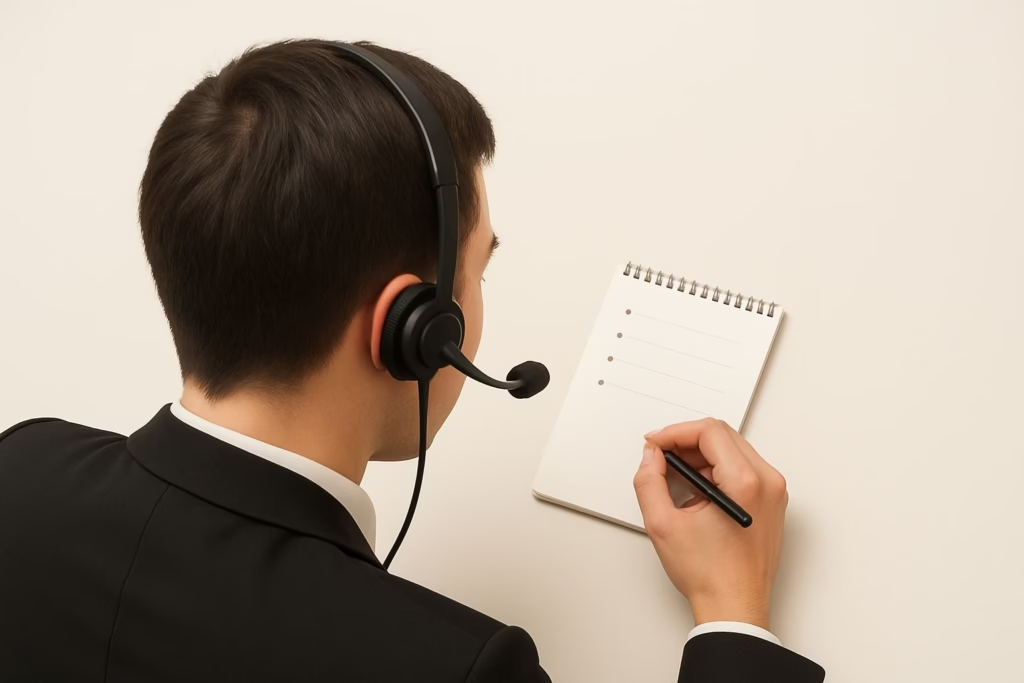How to Pass the Phone Screen: 10 Tips to Get to the Next Round

The phone screen, often the first hurdle in the hiring process, is deceptively simple yet critically important. Unlike in-person or video interviews, you lack visual cues – no firm handshake, no direct eye contact, no confident posture to convey your presence. Your voice, and your voice alone, becomes your primary instrument for making an impression. This means every word, every pause, every inflection carries immense weight. It’s not just about what you say, but how you say it, and crucially, how well you can convey enthusiasm, professionalism, and competence through sound alone. Passing this initial screening isn’t just about answering questions; it’s about mastering the art of aural engagement, demonstrating preparation, and proving you’re worth a deeper look. This guide will equip you with 10 actionable tips to navigate the unique challenges of the phone screen and secure your spot in the next round.

1. The Mindset: Treat it Like a Real Interview (Because it Is)
It’s easy to dismiss a phone screen as “just a call,” but this casual approach is a critical mistake. Recruiters and hiring managers use these calls to quickly filter out unqualified candidates. Approaching it with the same seriousness and preparation as a final-round interview will immediately set you apart.
- Dress the Part (Mentally): Even if you’re in your pajamas, dressing in business casual attire can psychologically shift your mindset, making you feel more professional and focused. It encourages a more formal posture and tone.
- Eliminate Distractions: This isn’t a casual chat. Turn off notifications, close unnecessary tabs, inform housemates you need quiet, and put pets in another room. Your full attention must be on the conversation.
- Stand Up and Move: Many find that standing or pacing slightly helps maintain energy and enthusiasm. It can also improve your vocal projection and confidence. Try it during your practice runs!
Why this matters: Your interviewer can hear your focus, or lack thereof. A distracted, casual tone suggests a lack of commitment, which is easily picked up on the phone and quickly leads to disqualification.

2. Your Remote Reconnaissance: Tailored Company & Role Research
While you don’t need to memorize the entire company history for a phone screen, targeted research is crucial. Focus on elements that allow you to demonstrate immediate relevance and genuine interest.
- The “About Us” and Mission/Values: Understand their core purpose and what drives them. This helps you align your answers with their culture.
- Recent News & Key Products/Services: A quick glance at their press releases or product pages shows you’ve done your homework. Mentioning a recent achievement or product launch can impress.
- Job Description Deconstruction: Break down the job description into key skills and responsibilities. Identify 2-3 of your experiences that directly align with each. This allows you to quickly connect your background to their needs.
- LinkedIn Stalking (Professional Edition): Look up the person who will be calling you. Understanding their role and background can help you tailor your conversation points and anticipate their perspective.
Why this matters: Generic answers scream “I applied to 50 jobs this week.” Specific references to the company and role demonstrate you are genuinely interested in their opportunity, not just *any* opportunity. This makes a strong positive first impression.
3. The Sanctuary: Crafting Your Sound-Proof Space
Ambient noise is the enemy of a successful phone screen. Find or create a quiet environment where you won’t be interrupted and where your voice can be heard clearly.
- Choose Your Location Wisely: A quiet room in your home, a private office, or even a parked car (if absolutely necessary and with good signal) are far better than a bustling coffee shop or a public park.
- Minimize Background Noise: Close windows to block street noise. Turn off televisions, radios, and any appliances that hum or beep. Even a ticking clock can be distracting on the other end.
- Inform Others: If you live with family or roommates, let them know you have an important call and ask for their cooperation in keeping noise levels down. Put a “Do Not Disturb” sign on your door.
Why this matters: A clear, uninterrupted connection allows the interviewer to focus solely on your answers, not on deciphering your words over background noise. It conveys professionalism and respect for their time.
4. Tech Check: Your Aural Arsenal
Your equipment can make or break your phone screen. A poor connection, muffled audio, or sudden disconnects are instant red flags.
- Use a Reliable Phone/Headset: A landline is ideal for stability, but a fully charged mobile phone with excellent signal strength works too. Avoid calling from areas with spotty reception.
- Invest in a Good Headset: A quality headset with a microphone close to your mouth will dramatically improve sound clarity and reduce echo. This also frees up your hands for note-taking. Test it beforehand!
- Test Your Connection: Make a test call to a friend or family member before the interview. Ask them about your voice clarity, volume, and any background noise they hear.
- Have a Backup Plan: Know your interviewer’s email address or the recruiter’s contact number in case of a dropped call or technical issue. Don’t be afraid to immediately call back if disconnected.
Why this matters: Technical glitches convey disorganization or lack of preparation. A smooth, clear call ensures your message is received without interference, allowing your qualifications to shine.
5. The Smart “Cheat Sheet”: Your Invisible Script
One of the hidden advantages of a phone screen is the ability to have notes. This isn’t about reading a script verbatim, but rather having key information at your fingertips to stay on track and deliver strong, relevant answers.
- Your Resume Highlights: A concise list of key achievements, skills, and quantifiable results from your resume.
- Tailored STAR Stories: Bullet points for 3-5 adaptable STAR method stories, ready to be used for behavioral questions. Focus on problem-solving, teamwork, leadership, and initiative.
- Company-Specific Notes: Key facts about the company, its mission, recent news, and how your skills align with their needs.
- Your Prepared Questions: A list of thoughtful questions to ask the interviewer.
- Job Description Breakdown: Key responsibilities and desired qualifications from the job posting, allowing you to seamlessly weave them into your answers.
Pro-Tip: Organize your notes neatly on a computer screen (if you have two monitors) or a physical notepad. Keep them concise, using keywords and bullet points. Avoid full sentences that you might be tempted to read, as this will make you sound robotic.
Why this matters: Notes provide a safety net, ensuring you don’t forget crucial points or get flustered. They enable you to sound articulate, organized, and well-prepared without sounding robotic.
6. Master the Microphone: Conveying Enthusiasm Through Voice
Without body language, your voice is your only vehicle for conveying personality and enthusiasm. This is arguably the most crucial aspect of a successful phone screen.
- “Smile with Your Voice”: A genuine smile changes the tone of your voice, making it sound warmer and more inviting. Try smiling as you speak.
- Vary Your Pitch and Pace: A monotone voice can sound bored or disengaged. Vary your pitch to emphasize key points and adjust your pace to ensure clarity and engagement. Don’t rush, but don’t drag either.
- Enunciate Clearly: Speak clearly and articulate your words. Avoid mumbling or speaking too softly.
- Show Enthusiasm: Use words that convey excitement and passion (“I’m truly excited about…”, “I thrive on challenges like…”, “I’m passionate about…”). Let your voice reflect your genuine interest.
- Pause Strategically: Don’t be afraid of short pauses. They allow the interviewer to process what you’ve said and give you a moment to collect your thoughts. They also make you sound thoughtful, not rushed.
Why this matters: Your verbal energy dictates the interviewer’s perception of your enthusiasm and engagement. A flat, unenthusiastic voice, no matter how good your answers, will rarely lead to a callback.
7. The Art of Active Listening: More Than Just Hearing
Active listening is a two-way street that fosters connection and ensures you answer appropriately.
- Listen for Keywords: Pay attention to specific terms, challenges, or company values the interviewer mentions. Weave these into your responses to show you’re engaged and understand their needs.
- Avoid Interrupting: Wait for the interviewer to finish their question or statement completely before responding. Silence is better than talking over someone.
- Confirm Understanding: If a question is complex, it’s okay to say, “Just to clarify, are you asking about X or Y?” This shows attentiveness.
- Take Brief Notes: Jot down key points of their questions or any new information they share. This helps you formulate a precise answer and remember details for your follow-up.
Why this matters: Active listening demonstrates respect, critical thinking, and strong communication skills. It allows you to tailor your answers precisely to what the interviewer is truly looking for, rather than giving generic responses.
8. Your Condensed Story: The Phone Screen Elevator Pitch
The “Tell me about yourself” question is almost guaranteed. For a phone screen, your answer needs to be concise, compelling, and relevant.
- The Present, Past, Future Framework:
- Present: Briefly state your current role and 1-2 key responsibilities or achievements.
- Past: Highlight 1-2 relevant experiences or skills from your background that led you to your current point.
- Future: Connect your aspirations to this specific role and company, emphasizing why you’re a perfect fit.
- Keep it Under 90 Seconds: This is a quick summary, not your life story. Practice timing yourself.
- Focus on Relevance: Don’t list every job you’ve ever had. Cherry-pick experiences and skills directly relevant to the role you’re interviewing for.
Example: “Currently, I’m a Marketing Specialist at [Current Company], where I’ve successfully managed digital campaigns, increasing lead generation by 20% in the last year. Prior to this, I honed my content creation and SEO skills at [Previous Company]. I’m now looking to leverage my expertise in [specific skill] to contribute to a forward-thinking company like [Their Company Name], particularly in a role focused on [specific aspect of the job description], which deeply aligns with my passion for [relevant industry trend].”
Why this matters: A well-rehearsed, concise pitch immediately establishes your professional brand and demonstrates your ability to communicate effectively, even without visual aids.
9. Practice Makes Audible Perfection: Common Questions
While you can’t predict every question, many phone screen questions are standard. Practice answering them aloud, focusing on clarity, conciseness, and how you sound.
- “Why are you interested in this role/company?”: Your research shines here. Connect your career goals and values to their mission and recent successes.
- “What are your greatest strengths/weaknesses?”: For weaknesses, choose a real one you’re actively working on improving, and frame it positively with action steps.
- “Tell me about a time when… (Behavioral Questions)”: Use the STAR method (Situation, Task, Action, Result). Have 3-5 stories ready that showcase different skills (problem-solving, teamwork, leadership, dealing with conflict).
- “What are your salary expectations?”: It’s best to have a researched range based on your experience and the industry/location. You can also pivot to, “I’m open to discussing compensation once I learn more about the full scope of the role and its responsibilities, but I’m looking for a competitive package that reflects my experience.”
- “When are you available to start?”: Be clear and realistic.
Why this matters: Practicing aloud helps you refine your answers, eliminate filler words, and ensure your delivery is smooth and confident. It reduces the chance of stumbling or sounding unsure, which can be amplified over the phone.
10. Turn the Tables: Your Thoughtful Questions
At the end of most phone screens, you’ll be asked if you have any questions. This is not a formality; it’s an opportunity to show your engagement and critical thinking. Never say “No, I think you’ve covered everything.”
- Ask About the Role’s Challenges: “What do you see as the biggest challenge for someone in this role in their first 6-12 months?”
- Inquire About Team Dynamics: “How would you describe the culture of this team/department?” or “What’s the typical collaboration style within the team?”
- Clarify Next Steps: “What are the next steps in the interview process, and what’s the expected timeline?”
- Ask About Success Metrics: “How is success measured in this role?”
- Demonstrate Your Research: “I saw on your website that you recently launched [Product X]. How will this role contribute to its ongoing success?” (Only if genuinely relevant and not easily answered by basic research).
Why this matters: Asking questions shows initiative, genuine interest, and that you are evaluating the opportunity as much as they are evaluating you. It transforms the call from an interrogation into a professional dialogue, leaving a strong final impression.
Bonus Tip: The Prompt & Polished Follow-Up
Your effort doesn’t end when the call disconnects. A swift, professional follow-up is critical.
- Send a Thank-You Email Within 24 Hours: This is non-negotiable. Reiterate your enthusiasm for the role and the company.
- Personalize It: Reference something specific you discussed during the call. “I particularly enjoyed learning about the team’s approach to [specific project/challenge]…”
- Reiterate Your Fit: Briefly (one sentence) reinforce why your skills and experience are a strong match for the role.
Why this matters: A well-crafted thank-you note reinforces your professionalism, attention to detail, and continued interest, helping you stand out among other candidates who might neglect this crucial step.
Conclusion: Dialing Up Your Success
The phone screen is your golden ticket to the next stage of the hiring process. While it lacks the visual dynamics of an in-person interview, it demands an even greater mastery of verbal communication, preparation, and auditory presence. By treating it with the seriousness it deserves, meticulously preparing your environment and answers, and, most importantly, by projecting genuine enthusiasm and professionalism through your voice, you can overcome the unique challenges of this format. Remember, every tip, from crafting your cheat sheet to mastering your vocal delivery, is designed to help you paint a vivid picture of your capabilities and personality using sound alone. Conquer the phone screen, and you’ll not only progress to the next round but also build invaluable confidence for every interview that follows. Good luck – your next opportunity is just a call away!
- Stop Preparing for the Google Interview of 2020. Here’s What Changed.
- We Asked 100 Google Engineers How They Use Gemini: Here’s What We Learned
- Why Your Next Promotion Might Depend on Your AI Literacy (Not Your Code)
- From Marketing to Machine Learning: How One Googler Reinvented Their Career
- A Tuesday at Google: Why Our Offices Are Buzzing Again
FAQ
What is the main challenge of a phone screen compared to an in-person interview?
The primary challenge is the lack of visual cues. You cannot rely on body language, facial expressions, or eye contact to convey your enthusiasm, confidence, or engagement. All of these must be communicated solely through your voice: your tone, pace, clarity, and choice of words. This makes verbal communication skills paramount.
How can I convey enthusiasm effectively without visual cues during a phone screen?
To convey enthusiasm, focus on your vocal delivery. ‘Smile with your voice’ – a genuine smile can be heard in your tone. Vary your pitch and pace to avoid sounding monotone. Use enthusiastic language, positive affirmations, and energetic vocabulary. Standing or pacing during the call can also help maintain a lively and engaged vocal presence.
Should I have notes during a phone screen, and how should I use them?
Yes, having a ‘cheat sheet’ of notes is a significant advantage. Include key facts about the company and role, bullet points for STAR method stories, and a list of questions to ask. However, avoid reading verbatim; use notes as prompts to ensure you cover all your key points and sound articulate, not robotic. Keep them concise and organized for quick reference.
What’s the best way to prepare for the ‘Tell me about yourself’ question on a phone screen?
Prepare a concise 60-90 second elevator pitch using the Present, Past, Future framework. Start with your current role and key achievements, briefly touch upon relevant past experiences, and conclude by connecting your aspirations directly to the role and company. Practice it aloud to ensure it flows naturally and hits all the essential points without sounding rushed.
Is it really necessary to send a thank-you note after a phone screen?
Absolutely, it’s highly recommended. Sending a personalized thank-you email within 24 hours reinforces your professionalism, attention to detail, and continued interest. Mention something specific from your conversation to make it memorable and briefly reiterate why you believe you’re a strong fit for the role. This can significantly enhance your chances of moving to the next round.



